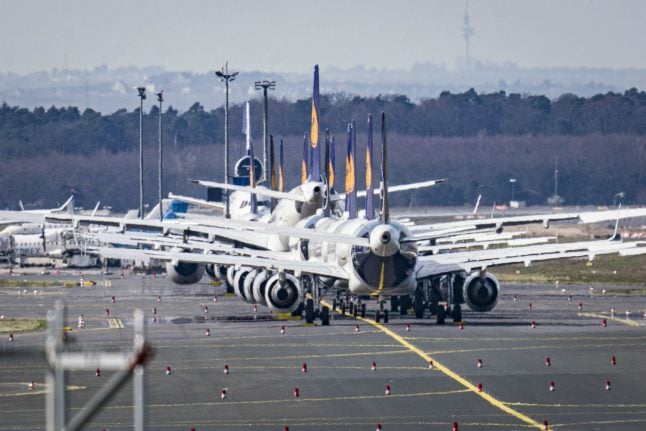Lufthansa said seating capacity on long-haul flights would be reduced “by up to 90 percent” from Tuesday, affecting mainly routes to Africa, the Middle East and South America.
Within Europe, the group is cutting around 80 percent of its short-haul capacity from Tuesday, it said in a statement. The group had originally planned some 11,700 weekly short-haul connections this summer.
The new flight schedule will stay in place at least until April 12th, it added. The group has introduced flexible rebooking options for anyone who holds a ticket with them in the coming weeks, including previously non-refundable or changeable tickets.
The move comes airlines around the world face plummeting demand and government-ordered travel restrictions that have forced airlines to scrap thousands of flights and take huge financial hits.
READ ALSO: These are the countries banning or restricting travel from Germany
The group also announced that its Austrian Airlines subsidiary will halt all flights until March 28th, but will continue to operate flights to repatriate Austrians trapped abroad.
The parent company too has put on special flights to repatriate stranded German holidaymakers.
Lufthansa announced on Friday that it would scrap dividend payments for 2019 to help preserve liquidity.
The group, whose brands also include Eurowings, Brussels Airlines and Swiss, had last week already said it was cancelling 23,000 flights between March 29th and April 24th as more countries close their borders to stem the pandemic.
Like other airlines, Lufthansa was especially roiled by the United States' surprise ban on travellers from Europe.
The group, which employs some 135,000 people worldwide, has embarked on a mass cost-cutting drive to weather the turbulence.
It plans to postpone investments and put some staff on reduced working hours, benefitting from relaxed regulations newly put in place by the German government.
READ ALSO: Coronavirus: How Germany plans to shield companies from bankruptcy
Warning that the industry was facing an “exceptional crisis”, it has said that this year's adjusted operating profits (EBIT) would be “significantly below” 2019's €2.0 billion.
To keep credit flowing, the group said it had already raised around €600 million in recent weeks, giving it a current total liquidity of around €4.3 billion, and was in talks to raise more.
Observers have said the airline might have to ask for state aid to keep flying.
“We have been assured that there are enough reserve funds to cover several more months of operations,” Janis Schmitt, a spokesman for the Cockpit pilots' union, told AFP.
Despite the upheaval in passenger travel, Lufthansa said its cargo operations had continued as normal, apart from cancellations to mainland China where the outbreak began.
Lufthansa will unveil detailed financial results for 2019 on March 19th.



 Please whitelist us to continue reading.
Please whitelist us to continue reading.
Member comments